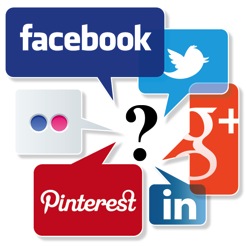Are Companies Liable for Employees’ Social Media Accounts?
 On Wednesday, I was fortunate enough to put on a webinar with our partner, Launch In US Alliance; a company that helps international technology companies looking to expand into the U.S. market. The webinar, What You Need to Know About Social Media When Expanding Into the U.S., allowed me to connect with B2B professionals here and overseas who share my enthusiasm for social media.
On Wednesday, I was fortunate enough to put on a webinar with our partner, Launch In US Alliance; a company that helps international technology companies looking to expand into the U.S. market. The webinar, What You Need to Know About Social Media When Expanding Into the U.S., allowed me to connect with B2B professionals here and overseas who share my enthusiasm for social media.
In doing so, I met Andrew Rudin of Outside Technologies, Inc., a firm specializing in social media and sales strategies for information technology companies, associations, and non-profits. We briefly discussed having a comprehensive company social media policy, and he shared with me an article he wrote on the subject: Human Talent or Party Animal? When an Employee’s Social Media Content Becomes a Legal Liability.
Do you need a company social media policy?
It’s an interesting read, tying together how social media, employees, and company policy work together. One thing that’s becoming clearer as social media usage and marketing grow is the importance of establishing a written company policy that addresses company social media use and also private employee social media use.
Creating a plan for company social media usage is the clearer of the two; having guidelines for social media posting on behalf of the company through company accounts is a great way to involve more employees in your social media marketing with a clear voice and message. Employees here should have a clear understanding of what the company wants to say, how to say it, and how to interact with consumers.
A gray area, however, is personal employee posting. Consider this quote from the article:
“The key point to note is simply that it is possible for employers to be held liable for employees’ social media statements that cause harm, even if made ostensibly off the job. But whether liability actually will be imposed in any particular situation is hard to predict. Employers need to be aware of the risk and take steps to mitigate that risk by setting up appropriate policies to guide their employees’ online actions.”
You don’t want to overstep your bounds as a boss by enforcing strict standards in an employee’s personal social media usage. However, when it’s public, employee social media posting can pose a threat, so creating and understanding with your employees when it comes to personal posting is necessary.
And you definitely need central company profiles.
Also, this shows that it makes sense to ensure that you have established company social media accounts rather than having several people post company info from their personal accounts. This eliminates any consumer confusion in trying to access your company online, and provides a branded online presence for maximum marketing impact:
“Personal accounts create confusion with customers because it’s unclear whose voice is behind a post. Would your prospects understand why there are consecutive Tweets announcing your new product release, followed by one ranting about the long line at the dry cleaner?”
So, are you liable?
Potentially, yes, although it is still a matter in question:
“One of the $8 million questions that courts are wrestling with now is whether statements made by employees in social media can be attributed to the employer, and there is a lot of gray area.”
It may come down to what is posted publicly versus privately, and on which site. People are often more private when it comes to their Facebook activity, but tweeting is largely public.
In the meantime, Rudin recommends posing it to employees this way: “don’t post anything that they wouldn’t want to see on the front page of The New York Times or hear on the witness stand.”
How do you monitor your employee’s social media presence? Do you have a social media guide?
